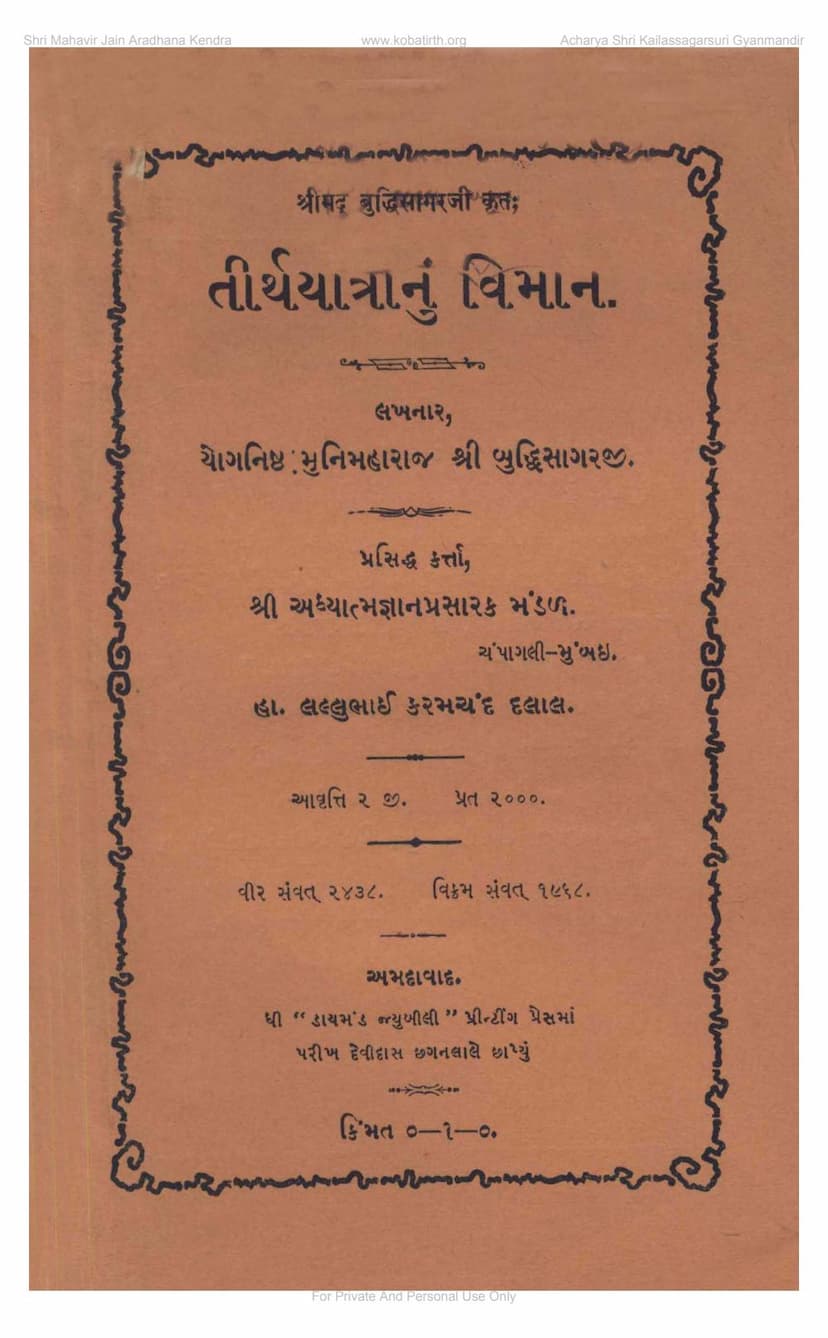Tirthyatranu Viman
Added to library: September 2, 2025

Summary
The book "Tirthyatranu Viman" (The Chariot of Pilgrimage) by Muni Buddhisagar, published by Adhyatma Gyan Prasarak Mandal, is a comprehensive guide and reflection on the significance and proper conduct of Jain pilgrimages.
The central theme of the book is that a pilgrimage is not merely a physical journey to sacred sites but a profound spiritual undertaking aimed at self-purification, eradication of karma, and ultimately, liberation. It emphasizes that the true success of a pilgrimage lies in the internal transformation and the cultivation of virtues, rather than just the outward ritual.
The author, Muni Buddhisagar, addresses various aspects of pilgrimage, highlighting the importance of:
- Purposeful Pilgrimage: Understanding the true objective of pilgrimage is to shed karmic burdens and achieve spiritual upliftment. The name "Siddhachal" itself implies the path to obtaining the supreme soul.
- Cultivating Virtues: The book details essential virtues that pilgrims should embody, such as:
- Compassion (Daya) and Truthfulness (Satya): These are presented as foundational virtues, crucial for a meaningful pilgrimage.
- Abstinence from Theft (Chori no Tyag).
- Abstinence from Licentiousness (Vyabhichar no Tyag): Emphasizing that committing sins at a holy site is worse than doing so elsewhere.
- Renunciation of Attachment to Possessions (Parigrah ni Mamta no Tyag): Advising detachment from wealth and its proper use for righteous purposes.
- Abstinence from Vices (Vyasan no Tyag): Identifying and renouncing harmful habits like addiction to substances.
- Abstinence from Conflict (Kalesh no Tyag): Stressing the importance of maintaining peace and avoiding disputes, even with the slightest provocation.
- Benevolence (Paropkar): The act of helping others, which is seen as a reflection of the teachings of the Tirthankaras.
- Generosity to Worthy Recipients (Supatra Daan): Encouraging the donation of wealth and resources to the four pillars of the Jain Sangha (monks, nuns, laymen, laywomen), knowledge, renovation of temples, and commendable deeds.
- Role of Ascetics and Laypeople: The book provides guidance for both monks and lay followers (Shravaks and Shravikas). It addresses the shortcomings observed in some ascetics, such as complacency or attachment to worldly comforts, and urges them to actively engage in spreading the Dharma. For laypeople, it stresses the importance of understanding Jain principles, practicing virtues, and supporting the spiritual path of ascetics.
- Critique of Contemporary Practices: The author critically examines the prevailing practices and attitudes of some pilgrims and ascetics. He points out instances of hypocrisy, self-interest, and a lack of genuine spiritual fervor, which detract from the true purpose of pilgrimage. The book also laments the decline in religious knowledge and practice among some Jain families, leading to conversions to other faiths.
- Importance of Knowledge and Wisdom: A significant portion of the book is dedicated to the indispensable role of knowledge (Gyan) in Jainism. It argues that mere ritualistic actions without understanding the underlying principles are fruitless. True pilgrimage and spiritual progress are achieved through profound knowledge of Jain tenets, the study of scriptures, and the guidance of enlightened gurus.
- Role of Jain Gurukuls and Education: The book strongly advocates for the establishment of Jain Gurukuls (residential schools) to impart both religious and secular education. It highlights the need to nurture a generation of knowledgeable and dedicated Jains who can effectively propagate the faith and counter the influence of other religions.
- The Concept of "Tirtha" (Sacred Site): The book expands the definition of "Tirtha" beyond physical places of worship to include the fourfold Jain community (monks, nuns, laymen, laywomen), scriptures (Shruta Gyan), and ultimately, the enlightened souls. The true pilgrimage involves revering and supporting these "moving Tirthas" as well.
- The Significance of Brahmacharya: The virtue of Brahmacharya (celibacy or controlled conduct) is emphasized as crucial for spiritual development and the strength of the Jain community. The author laments the prevalence of early marriages and the lack of emphasis on Brahmacharya, which he believes weakens the community.
- Call to Action: The book concludes with a fervent appeal to all Jains to awaken from their spiritual slumber, embrace the virtues, diligently study Jain scriptures, support the propagation of the faith, and actively contribute to the progress of the Jain community. It urges a departure from mere superficial adherence to rituals and a commitment to true spiritual practice and dissemination of knowledge.
In essence, "Tirthyatranu Viman" serves as a profound spiritual manual for Jain pilgrims, guiding them on how to undertake their journeys with the right intention, cultivate essential virtues, and actively participate in the spiritual upliftment and propagation of Jainism. It calls for a revival of genuine spiritual fervor and knowledge-based practice within the Jain community.